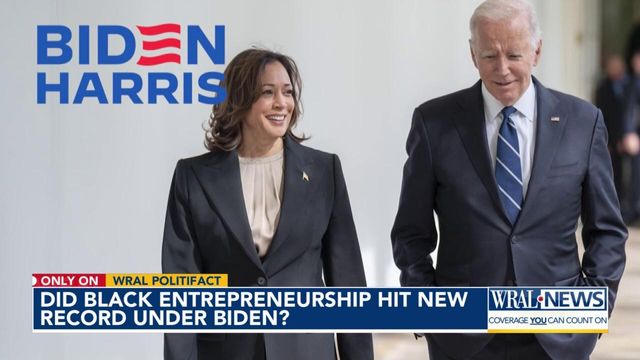Fact check: Has Black entrepreneurship hit a record during Joe Biden's presidency?
In an ad timed for Black History Month, President Joe Biden touted gains Black Americans made during his tenure.
The Feb. 13 advertisement said, "The lowest Black unemployment rate in history. Black child poverty cut in half. Record numbers of new Black entrepreneurs. And over $130 billion in student debt forgiven."
We’ve rated a few of those claims Mostly True: The record low for Black unemployment was reached in April 2023 and Black child poverty hit a record low of 22.3% in 2022. The Biden administration has also announced student debt forgiveness totaling $136 billion. While the student loan forgiveness efforts do not have racial guidelines, about 85% of Black undergrads finish college with student debt, compared with 69% of whites, so Black loan recipients benefit significantly from debt forgiveness efforts.
What about "record numbers of new Black entrepreneurs"? Biden has made similar comments a few times recently, including in campaign speeches Jan. 27 in South Carolina and Feb. 4 in Las Vegas.
Data supports the claim that the prevalence of Black-owned small businesses has reached record levels under Biden, based on available data since 1989.
What the data shows
According to a Brookings Institution analysis of the U.S. Census Bureau’s Annual Business Survey, the number of Black-owned businesses with more than one employee has increased every year since 2017. The biggest increase came between 2020 and 2021, when the number rose from about 140,000 to a little over 161,000. 2021 is the most recent year for which final data from this survey is available.
The growth from 2020 to 2021 represented the largest percentage increase — 14.3% — of any year since 2017.
The second dataset comes from the Federal Reserve’s Survey of Consumer Finances, conducted every three years, most recently in 2022.
The 2022 survey found that 11% of Black households held equity in a business, far higher than the previous record of 6.6% in 2016.
Black-owned businesses also grew faster in several categories than businesses owned by whites, Asian Americans, Latinos or Hispanics, and Native Americans did. Black-owned businesses had a 7% increase in employees, a 30% increase in revenue, and a 27% increase in payroll in 2021, the analysis by Brookings, a Washington, D.C.-based think tank, showed.
When contacted for comment, the White House shared independent analyses suggesting that some Biden policies helped spur these increases.
One policy involved changes the Biden administration made to the Paycheck Protection Program, a pandemic-era initiative that lent businesses money to keep workers paid when public health restrictions limited businesses’ operations. In most cases, the loans were designed to be excused if the recipient businesses followed the program’s regulations.
An August 2020 evaluation of the program found that minority-owned businesses were having trouble securing loans from the program, which began under former President Donald Trump and was approved with bipartisan congressional support.
When the program was phased out in June 2021, the Government Accountability Office found, "lending in traditionally underserved counties was proportional to their representation in the overall small-business community." GAO cited changes during the Biden administration that stoked this shift, such as expanding lender participation in the program, including self-employed people, and seeking minority businesses for lending.
A January 2022 study by Robert Fairlie of the University of California, Santa Cruz, found similar gains for minority business owners in securing Paycheck Protection Program loans.
The path to full equity
Despite recent gains, Black business ownership continues to trail rates for white Americans.
In 2021, Black Americans represented 14.4% of the U.S. population but 2.7% of business owners. By contrast, white Americans accounted for 72.5% of the U.S. population while owning 82% of businesses. Asian Americans made up 6.3% of the population but owned 10.9% of businesses. Like Black Americans, Latinos and Native Americans also own a smaller share of businesses than their share of the population.
"Even if Black business ownership continued to grow at the rate it did in 2021 — the largest percentage increase since 2017 — Black-owned businesses would still not reach parity with their population share for another 80 years," Brookings wrote.
Meanwhile, sole proprietorships — businesses without employees other than their owners — comprise a disproportionately large share of Black-owned businesses. Brookings wrote that although sole proprietorships "are an important driver of economic growth and wealth creation," businesses with additional employees can grow even faster. The report says the high number of Black sole proprietorships stems partly from "unequal access to capital, networks, and government contracts."
PolitiFact ruling

A Biden campaign ad said that during his presidency, there have been "record numbers of new Black entrepreneurs."
Census Bureau and the Federal Reserve Board datasets found record levels of Black business ownership in 2021 and 2022. Independent analyses say that some of Biden’s policies likely played a role.
We rate the statement True.











